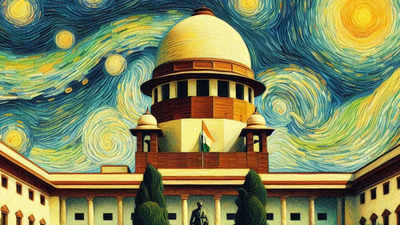AI image of the Supreme Court.
NEW DELHI: Giving trial courts full discretionary freedom in formulating their decisions in bail matters, Supreme Court has ruled that no constitutional court, be it SC or HC, can dictate a format for grant of bail to accused to be mandatorily followed by judicial officers.
The court quashed proceedings initiated by Rajasthan high court against district and sessions judge Ayub Khan for not sticking to the format devised by it that mandated specifying the criminal antecedents of the accused in a tabular form while granting bail.
Injustice by HC against sessions judge, says SC, erases adverse remarks
The bench of Justices A S Oka and A G Masih also expunged all adverse remarks against Khan and said injustice had been done to him by HC as “non-compliance of the format stipulated by HC cannot be treated as an act of indiscipline or contempt”.
Writing the judgment, Justice Oka said, “No constitutional court can direct trial courts to write orders on bail applications in a particular manner. One judge of a constitutional court may be of the view that trial courts should use a particular format. The other judge may be of the view that another format is better.”
Appearing for Khan, senior advocate Sidharth Luthra told the bench that HC was rather harsh in its judgment to indict the judicial officer despite his explanation that though he had referred to criminal antecedents of the accused, he had missed out tabulating them because of excessive work pressure. Trial courts are groaning under a monstrous pendency of over 4.6 crore cases.
Frowning at HC for terming this lapse as an instance of serious
judicial indiscipline
and referring the matter to HC chief justice for necessary action, SC said it was inappropriate on the part of HC to seek explanation from a judicial officer through a judicial order.
The bench said, “With the utmost respect to HC, undertaking such an exercise was a waste of precious judicial time of HC which has a huge pendency.” HCs are facing a pendency of 62 lakh cases. “We clarify that in view of what we have held earlier, the adverse remarks and observations made against the appellant in the aforesaid orders cannot be the basis for taking any action against the appellant on the administrative side,” it said.


